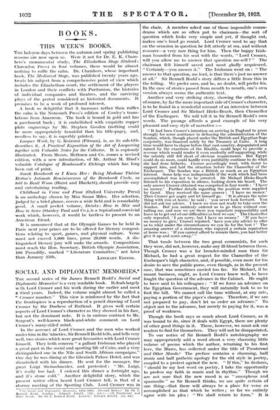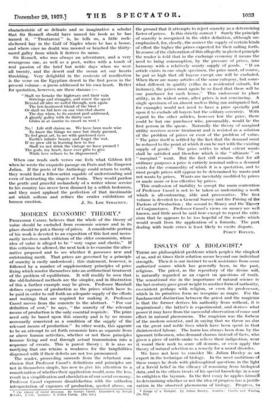SOCIAL AND DIPLOMATIC MEMORIES.*
THE second series of Sir James Rennell Rodd's- Social and Diplomatic Memories' is a very readable book. It deals largely w:th Lord Cromer and his work during the earlier and most c itieal years. Indeed, the volume might almost be called a
Cromer number." This view is reinforced by the fact that the frontispiece is a reproduction of a pencil drawing of Lord Cromer by the Duchess of Rutland. It gives well certain aspects of Lord Cromer's character as they showed in his face, but not the dominant note. It is in curious contrast to Mr. Sargent's well-known black-and-white comment on Lord Cromer's many-sided mind.
In the account of Lord Cromer and the men who worked under him in the 'nineties, Sir Rennell Rodd tells, and tells very well, two stories which were great favourites with Lord Cromer himself. They both concern " a gallant Irishman who played a great part in the social and sporting life of Cairo, and a very distinguished one in the Nile and South African campaigns." One day he was dining at the Ghczirch Palace Hotel, and was dissatisfied with his dinner. He sent for the manager, the great Luigi Steinschneider, and protested : " Mr. Luigi, it's really too bad. I ordered this dinner a fortnight ago, and it's stone cold." Another delightful story, which the present writer often heard Lord Cromer tell, is that of a stormy meeting of the Sporting Club. Lord Cromer was in
• (1.) .Social and Diplomatic Memories, 1894-1901. (Second Series.) By Sir S. 31.cnnell Road. London: Edward Arnold. 121e. net.]—(2) Trentaremi and Other Moods. By Sir 3. Rennell Rodd. Loudon: Edward Arnold. 149. 6d.]
the chair. A member asked one of those impossible conun- drums which are so often put to chairmen—the sort of question which looks very simple and yet, if thought out, makes one's head go round. Lord Cromer used to say that on the occasion in question he felt utterly at sea, and without resource—a very rare thing for him. Then the happy Irish- man bounded from his seat with the words, " Lord Cromer, will you allow me to answer that question me-self ? " The chairman felt himself saved and most gladly acquiesced. " Certainly—you answer it." The Irishman went on : " The answer to that question, me lord, is that there's just no answer at all." Sir Rennell Rodd's story differs a little from this in the telling. We prefer ours, and he, no doubt, will prefer his.
In the case of stories passed from mouth to mouth, one's own version always seems the authentic text.
Another and very striking story, showing the other, and, of course, by far the more important side of Cromer's character, is to be found in a wonderful account of an interview between Lord Cromer and Sir Michael Hicks-Beach, then Chancellor of the Exchequer. We will tell it in Sir Rennell Rodd's own words. The passage affords a good example of his very pleasant and easy style of narrative :—
" It had been Cromer's intention on arriving in England to press strongly for some assistance in defraying the administration of the Soudan, which, though placed under the British and Egyptian flags conjointly, was financed solely by the Treasury at Cairo. A long time would have to elapse before that vast country, depopulated and ruined by the exactions of the Khalifs, could hope to provide a revenue which would render it even modestly self-supporting, while the subsidy still fell short of obvious requirements. But Egypt could do no more, could hardly even justifiably continue to do what she had done hitherto. Cromer accordingly went, with Gorst to support him, and laid the situation before the Chancellor of the Exchequer. The Soudan was a British as much as an Egyptian interest. Some help was indispensable if the work which had been accomplished was not to be arrested. Sir Michael Hicks-Beach listened to his exposition in silence, looking down his beard. The only answer Cromer obtained was comprised in four words : I have no money.' Further details regarding the position were supplied by Gorst. They received the same answer : I have no money.' Then Cromer got angry and let himself go. It is always the same thing with you at home,' he said ; you never look forward. You did not ask my advice. I knew we were not ready to take over the Soudan. But you suddenly ordered us to go there without con- sulting me, and now we are there you repudiate responsibility and leave us to get out of our difficulties as best we can.' The Chancellor only repeated, I am sorry, but I have no money.' If you have no money to give,' Cromer rejoined, have you any advice to offer as to what under the circumstances we can do for the best ? ' The amazing answer of a statesman who enjoyed a certain reputation at home was : ' If you cannot afford to remain there, you had better give it up and come away.' "
That tussle between the two great economists, for such they were, did not, however, make any ill-blood between them. Though Cromer was a far broader-minded man than Sir Michael, he had a great respect for the Chancellor of the Exchequer's high character, and, if possible, even more for his desire to save the public purse, even though, as in the present case, that was sometimes carried too far. Sir Michael, if lie
meant business, ought, as Lord Cromer knew well, to have fought the question of the advance in the Cabinet. He ought to have said to his colleagues : " If we force an advance on the Egyptian Government, they will naturally look to us to foot the bill. We cannot call the tune without, at any rate, paying a portion of the piper's charges. Therefore, if we are not prepared to pay, don't let us order an advance." To object not to the advance, but merely to paying for it, was a
proof of weakness.
Though the book says so much about Lord Cromer, as it was bound to do, since it deals with Egypt, there are plenty of other good things in it. These, however, we must ask our readers to find for themselves. They will not be disappointed. To our notice of Sir Rennell Rodd's autobiography we may appropriately add a word about a very charming little volume of poems which the author, returning to his first love, the Muses, has collected under the title of Trentaremi and Other Moods? The preface contains a charming, half ironic and half pathetic apology for the old style in poetry, coupled to a protest against the new. " If this," he declares, " should be my last word on poetry, I take the opportunity to profess my faith in music and in rhythm." Though we are not sure that the new mood is as " amorphous and spasmodic " as Sir Rennell thinks, we are quite certain of one thing—that there will always be a place for verse so accomplished as that which he writes ; so far we entirely agree with his plea : " We shall return to form." It is characteristic of so delicate and so imaginative a scholar that Sir Rennell should have named his book as he has named it. " Trentaremi " is, he tells us, a little rock- sheltered bay in the Gulf of Naples where he has a house, and where once no doubt was moored or beached the thirty- oared galley from which it derives its name.
Sir Rennell, who was always an adventurer, and a very courageous one, as well as a poet, writes with a touch of real passion of the brief but noble days when we were all twenty, and the desert and the ocean set our hearts throbbing. Very delightful in the contexts of recollection is the verse on the Egyptian desert in the first poem in the present volume—a poem addressed to his own heart. Better for quotation, however, are these stanzas :-
"Shall we forsake the highways and their vain
Strivings and struggles, and renew the quest Beyond all isles we sailed through, seek again The low-horizoned island of the blest ? Or shall we bid here on our vine-clad shores The day when, to its ancient port addressed, A ghostly galley with its thirty oars Glides in at sunrise to escort us west ?
No ! Life still claims us. We have been made wise To know the things we once but dimly guessed, To feel great art, to see with quickened eyes Earth's infinite beauty and forget the rest. If we grew old in learning how to live Shall we not drink the vintage we have pressed ? The gods, my heart, have ever gifts to give While love refuses to be dispossessed."
When one reads such verses one feels what Gibbon felt when he wrote the exquisite passage on Paris and the Emperor Julian. If the poets of the Anthology could return to earth, they would find a fellow-artist capable of understanding and even of instructing the singers of Ionia. They would pardon the gentle and graceful melancholy of a writer whose service to his country has never been dimmed by a selfish hedonism, and they must applaud the perfection of that inestimable art which softens and refines the cruder exhibitions of



































 Previous page
Previous page